On December 28, 2019, the 2nd China Financial Security Forum and the press conference of "Report on China Financial Security (2019)", "Report on Global Systemic Risk Trend (2019-2020)", "Report on Global Country Systemic Risk Trend (2019-2020)" and "Report on International Politics and China Financial Security (2019)" were held in Beijing with the theme of "Financial Security under the New Pattern of China's Opening-up". The forum was jointly sponsored by SWUFE, Institute of World Economics and Politics, Chinese Academy of Social Sciences, and Shanghai Development Research Foundation. It was jointly organized by ICFS of SWUFE, Collaborative of Innovation Center of Financial Security (CICFS), Center for Financial Security and Development of 111 Programme, Think Tank for International Politics and Financial Security, and Global Financial Strategy Lab of SWUFE.
Based on the current situation that China's economic downward pressure has increased and the long-term accumulated risks and hidden dangers have been exposed, the forum aims to take a global view of China's financial security hot issues and perspective the state of China's financial security. More than 100 guests from domestic academic communities, financial regulatory authorities, and financial institutions attended the forum. Attendees include ZHU Guangyao, former Vice Minister of Ministry of Finance; LIU Jiaqiang, Vice Chairman of the Revolutionary Committee of the Chinese Kuomintang and Deputy Secretary General of the CPPCC National Committee; WU Fulin, Vice President of the Bank of China; GAO Jian, former Vice President of China Development Bank; ZHANG Yuyan, Member of the Chinese Academy of Social Sciences and Director of the Institute of World Economics and Politics; Prof. YANG Dan, President of Beijing Foreign Studies University; Major-general YANG Yi, former Director of the Institute of Strategic Studies at China's National Defense University; Prof. HUANG Weiping, former Dean of School of Economics of Renmin University of China; researcher WEI Jianing, former Vice Minister of Department of Macroeconomics Studies of Development Research Center of the State Council; researcher HE Dexu, President of National Academy of Economic Strategy, CASS; researcher HUO Jianguo, former Director of Chinese Academy of International Trade and Economic Cooperation; researcher JIANG Yong, Director of Economic Security Research Center of China Institutes of Contemporary International Relations (CICIR); outside international business Prof. CHENG Dawei, Executive Director of International Business Diplomacy Project of China and International Economics Department of Renmin University of China; GUO Zhouming, President of China Commerce and Trade Press and Executive Director of Zhong Shang Zhi Ku Corp.; QIAO Yide, Vice President and Secretary General of Shanghai Development Research Foundation; Prof. WANG Yurong, Deputy Director of Society & Finance Center of School of Social Sciences, Tsinghua University; and Honorary Director of ICFS, Prof. LIU Xiliang; Prof. WANG Qing, Director of ICFS.
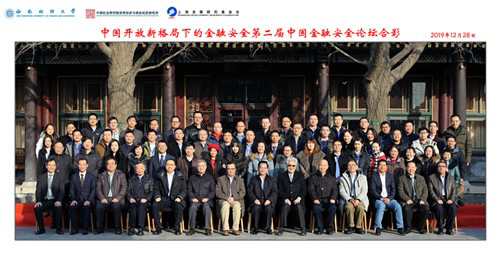
"Report on China Financial Security 2019" believes that China's financial risk in 2019 is overall stable. Specifically, the financial market risk fluctuated upward, and the absolute value of the financial pressure index rose to the highest level of the whole year in October 2019, and the deviation range was still within the controllable range. The risks of financial institutions went down steadily and the potential risks were reduced. The macro-financial risk fluctuates greatly, and the risk level is still relatively higher.
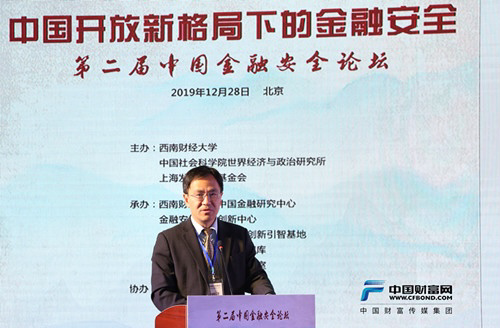
According to the "Report on Regional Financial Risk 2019", China's overall financial risk index rose briefly from 2008 to 2009, and then began to fluctuate and decline due to the improvement of a regional economic risk situation, and reached the lowest point in nearly ten years in 2013. After experiencing the trough value in 2013, owing to the continuous rise of the risk index of banking, household, and enterprise sectors, the overall financial risk index fluctuated and rose, reaching the highest level since 2008 in 2018.
"Report on Global Country Systemic Risk Trend (2019-2020)" suggests the global systemic risk is still high. In 2019, the global economy is nearly in recession. The US Federal Reserve has cut interest rates three times, many central banks have lowered interest rates many times, and some emerging market economies have experienced a financial crisis. The global systemic risk has been rising in the repeated trade friction, geopolitical conflict, and domestic political and social conflict. There are obvious differences in systemic risks among regions or organizations, and the levels of systemic risks in different countries are clear.
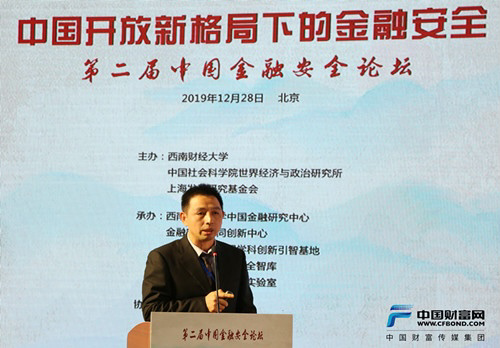
According to the "Report on International Politics and China Financial Security (2019)", the overall impact of major international political factors on China's national financial security inched from -29.5 in the previous year to -26.1 in 2019, reflecting that China's national financial security continues to be negatively affected by external or international political factors, which is slightly better than that of the previous year. The standard deviation of the impact of major international political factors on China's financial institutions, financial environment, financial regulation, and financial sovereign security in 2019 is smaller than that in 2018, meaning that the differences or heterogeneity of the impact strength of major international political factors on China's financial security in different aspects will be reduced in 2019.
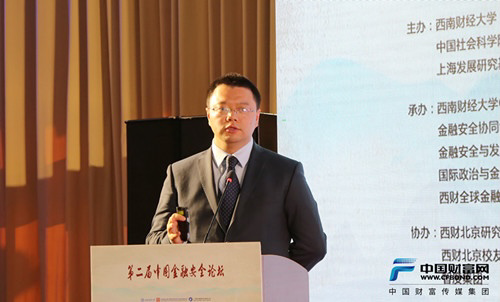
At the forum, several guests delivered keynote speeches. Among them, Vice Minister ZHU Guangyao summarized the favorable conditions for the development of the digital economy in China from three aspects naming infrastructure, base station facilities, and electronic payment. ZHU also elaborated the challenges faced by China's development of the digital economy from governance system and international policy perspectives, and finally analyzed the digital tax issues related to digital currency. Focusing on the current economic situation, LIU Jiaqiang made a very detailed interpretation of the policy structure in terms of planning, industrial development, and improvement of people's livelihood. LIU also put forward the concern for people, saying people are the core for the course of development and the economic issues. Starting from “close-the-curtain” LIBOR and “ready-to-debut” Libra, WU Fulin deeply analyzed the international market environment and the development background of LIBOR. The changes facing the monetary system have also led people to think about the world analysis framework and technological innovation. GAO Jian then analyzed how to solve the financial risk through economic development, financial deepening, and technology application, and deemed that the economic development includes two aspects: whether growth is the goal of macro policy and how to achieve growth. However, financial deepening is a process of continuous specialization for risk reduction. From the perspective of international strategic pattern, YANG Yi put forward his views on the strategic dilemma and the dilemma faced by financial security, saying that in the face of Sino-US relations, we should stay calm, and strengthen the establishment of mechanism, legislation, and personnel training. Seeing from the world economic structure and Sino-US trade relations, Prof. HUANG Weiping elaborated on the in-depth analysis of China's economic slowdown and development momentum. Starting from the impact of the industrial revolution on the change of the world's "rules of the game", he analyzed the reasons for the slowdown of economic growth and the increase of downward pressure, and indicated that at the time point of the superposition of the three periods, we should continue to deepen reform and expand opening-up to face the changing economic environment.
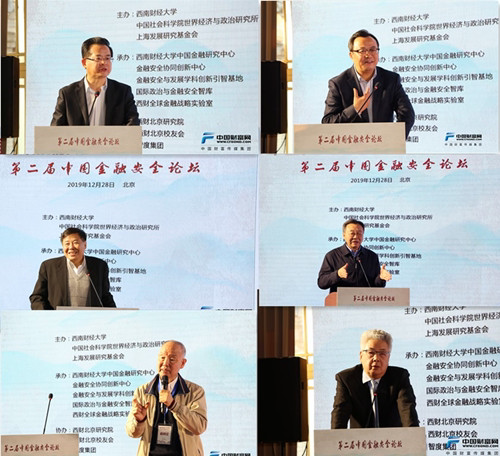
In addition, some guests judged and analyzed the prevention and resolution of China's systemic financial risks, and put forward their own views on how to maintain China's financial security. For example, (1) from a new perspective, researcher WEI Jianing observed and analyzed the formation mechanism of systemic financial risk, its relationship with monetary policy, information mechanism, and other aspects, as well as the path of how to prevent and resolve systemic risk; (2) researcher HE Dexu focused on the increasing economic downward pressure, China's expanding degree of opening-up and the rapid development of Fintech; (3) based on the changes in international economic pattern, WTO and Sino-US conflicts, researcher HUO Jianguo analyzes the difficulties in matching China's economic operation with macro policies, including exogenous economic development, innovation-driven policy, opening finance to the service industry, industrial policy and financial policy, etc. He supposed that the current task should still focus on how to promote trade and foreign investment.
On the issue of "the extension and response of Sino-US trade frictions to finance", several guests expressed their views. Among them, from the perspective of system view and holistic view, researcher JIANG Yong put forward some suggestions on development and construction, such as restricting the flow of foreign capital, limiting the interest rate of the financial industry lower than the industrial profits, and controlling the financial innovation separated from the real economy. Prof. CHENG Dawei highly summarized the stages of Sino-US trade war, and deeply analyzed the regular characteristics behind the war, and proposed that the standard decoupling was likely to start from science and technology. In addition to the science and technology war, the financial war may also be a long-term war. From the very unique perspective of the Book of Changes, CUO Zhouming put forward his views on global events and the new pattern, and interpreted the development of Sino-US trade from national opening-up, policy stability, and soft power.
Digital currency is an essential topic of general concern recently. In the round table forum with the theme of "Challenges and Responses to Digital Currency", CHEN Yongwei, Director of Comparative Studies, made an in-depth analysis on the blockchain from the perspective of technology and application, and introduced the challenges of blockchain to the financial field in detail. ZHAO Guodong, Secretary-General of Zhongguancun Big Data Industry Alliance, indicated the blockchain providing a low-cost general asset solution and its huge value brought by all walks of life. ZHAO also pointed out that the banking industry and other industries are mainly facing the problems of blind spots in supervision, absence of supervision, improper supervision, etc. LU Hongda, Chairman of Investment Committee of GRNIMOUS and Chairman of Guoguang Electric Appliance Co., Ltd., from the Perspective of industry, focused on the challenges faced by blockchain in the construction of procurement system by using blockchain step by step. SONG Shuang, an assistant researcher at the Institute of World Economics and Politics of CASS, made a detailed and comprehensive analysis from three aspects: whether digital currency must be a multi-mode governance structure; what determines the governance structure of digital currency; and why cross-border payment is an important application field of digital currency and blockchain. WANG Lanyan, Deputy Secretary-General of Chinese Productivity Promotion Center Association, concisely introduced the nature of Libra asset, technological progress, and regulatory pressure faced by Libra, and pointed out that Libra is an ecosystem to a greater extent, which will impact the existing financial ecology and much attention should be paid to.
Reference: Brief Introduction to the Report and Issuing Organization
The "Report on China Financial Security (2019)", "Report on Regional Financial risk (2019)" and "Report on Global Country Systemic Risk Trend" released by this forum are important research results produced and continuously released by the Institute of Chinese Financial Studies of SWUFE (ICFS) and Collaborative of Innovation Center of Financial Security (CICFS). "Report on International Politics and China Financial Security (2019)" is the main research result produced and continuously released by the Think Tank for International Politics and Financial Security, which is established by CICFS of SWUFE and the Institute of World Economics and Politics, CASS.
ICFS of SWUFE is the only national financial research base of the Ministry of Education. It is committed to the study of major theoretical and practical problems in China's financial reform and development.
CICFS of SWUFE was established in 2012, aiming at the major issues and theoretical frontier that need to be solved urgently in the analysis of national financial security situation and strategic construction. It organically integrates the innovation forces of universities, government departments, and financial institutions, and it focuses on exploring collaborative innovation system and mechanism targeted at the major financial security issues, so as to ensure the sustainable and healthy development of China's economy and finance as well as to provide solid theoretical and policy support.